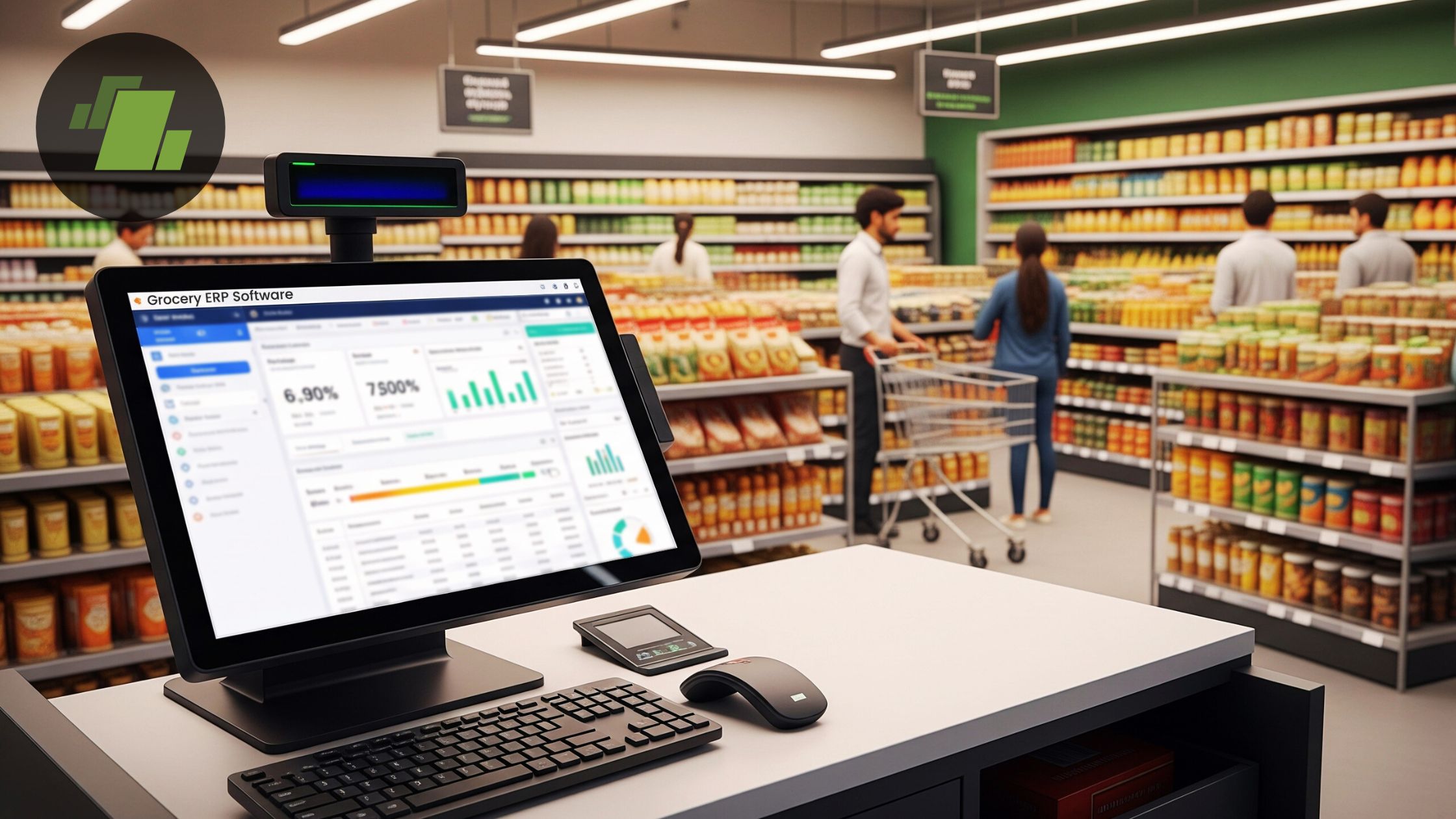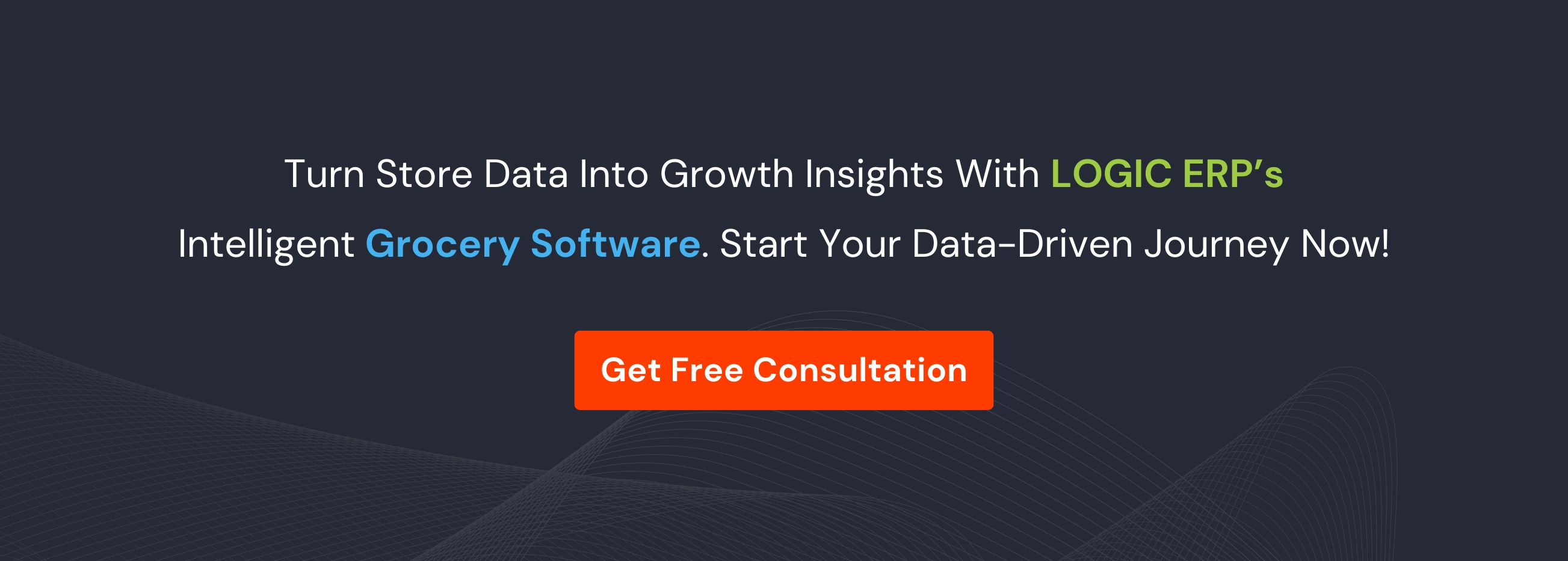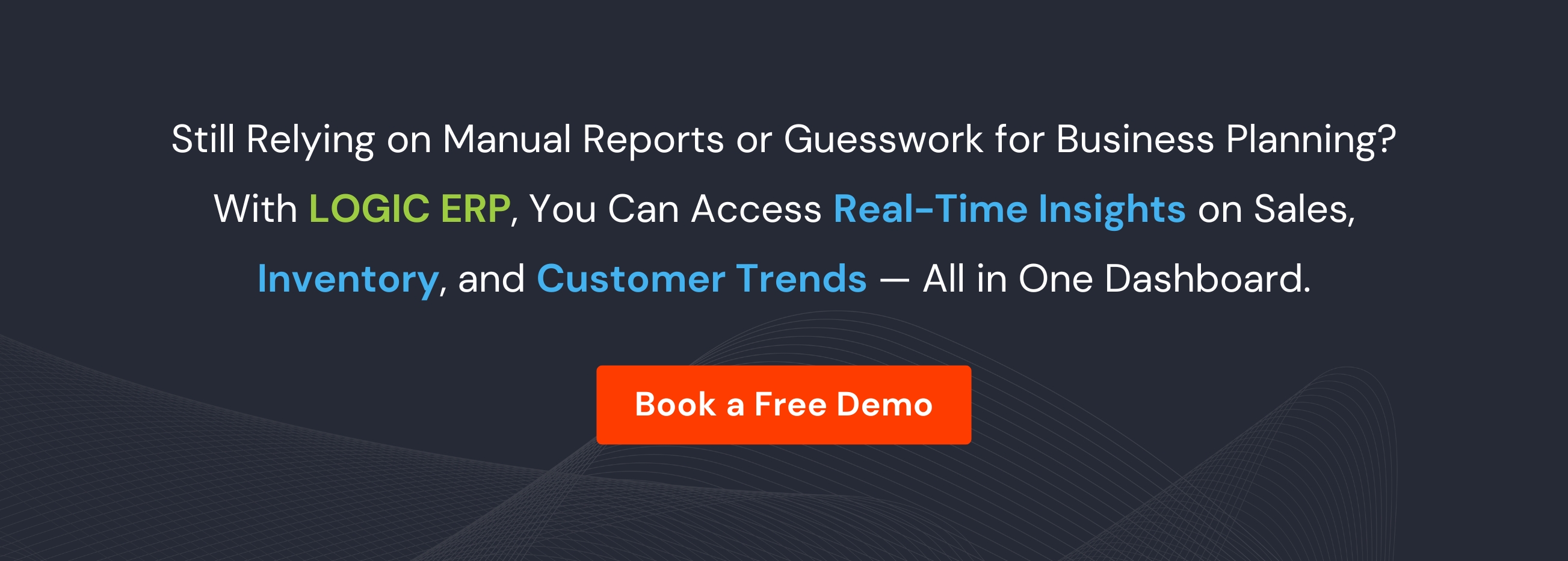Data-Driven Retailing: How Grocery ERP Software Helps in Business Decisions


Summary
Explore how grocery ERP software transforms retail decision-making with real-time data, analytics, demand forecasting, and KPI dashboards. See how LOGIC ERP empowers stores to optimize operations, reduce waste, improve margins, and scale efficiently.
Introduction
In today’s fast-moving grocery retail world, success depends on how quickly and accurately a business can make decisions. Whether you’re managing a supermarket chain or a local kirana store, every purchase order, pricing update, and customer offer should be backed by data.
The best grocery ERP software helps in transforming operations into an intelligent, data-driven ecosystem.
Data-driven retailing means using analytics and insights derived from real-time data to guide key decisions, from procurement and pricing to inventory and customer management. With the power of grocery ERP software, businesses can gain a 360-degree view of their operations, eliminate guesswork, and make confident, profitable choices.
Why Data-Driven Retailing Matters for Grocery Businesses
Retailers today face a highly competitive environment. Prices fluctuate, demand patterns change rapidly, and customer expectations are rising. Traditional intuition-based management is no longer sustainable.
Data-driven retailing supported by retail ERP software helps retailers:
- Reduce inventory waste and control costs
- Predict demand more accurately
- Improve customer satisfaction and loyalty
- Optimize supply chain and procurement cycles
- Maintain healthy profit margins
- Expand faster with clarity on performance metrics
In grocery retail, where margins are tight and operations complex, adopting a supermarket ERP software or grocery store software can turn everyday data into business intelligence.
Key Data Sources in Grocery Retail
Data drives every decision, but first, it must be collected correctly. A modern grocery ERP system consolidates data from multiple touchpoints:
- Point of Sale (POS): Transactional details, payment modes, offers redeemed, time-based sales trends.
- Inventory Management: Current stock levels, re-order alerts, expiry tracking, dead stock reports.
- Purchasing & Supplier Data: Vendor performance, price fluctuations, lead times, order fulfillment.
- Finance & Accounting: Cost of goods sold (COGS), gross margin, taxes, and expenses.
- Customer Information: Buying behavior, loyalty points, visit frequency, and preferences.
- Online & Offline Channels: Integration of eCommerce sales, delivery orders, and in-store transactions.
LOGIC ERP grocery software solutions unify all these data streams into one integrated dashboard, ensuring every decision is based on accurate, up-to-date insights.
Core Capabilities of Grocery ERP Software for Smarter Decision-Making
1. Real-Time Dashboards and Analytics
A major advantage of LOGIC ERP grocery software is its real-time analytics and dashboard capabilities. Managers can track:
- Daily, weekly, and monthly sales trends
- Top-selling and slow-moving products
- Real profit margins by category
- Real-time inventory positions and re-order needs
- Store performance comparisons
These live insights empower store owners and retail managers to act quickly — restock bestsellers, push slow movers, or modify pricing instantly.
2. Predictive Analytics and Demand Forecasting
With built-in AI-based forecasting tools, LOGIC ERP supermarket software can predict demand based on historical sales, seasons, and local events.
For instance, during festivals or weather shifts, demand for specific items (like dry fruits, packaged foods, or beverages) spikes. Automated purchase recommendations help retailers stay ahead of demand while avoiding overstocking.
By using predictive analytics, grocery businesses can maintain optimal stock levels, reduce storage costs, and improve working capital.
3. Inventory Management and Expiry Tracking
Inventory management is the backbone of every grocery business. LOGIC ERP’s grocery store software ensures retailers never lose money due to poor stock control.
Key inventory insights include:
- Tracking slow-moving and dead stock
- Managing expiry dates through FIFO (First In First Out) or FEFO (First Expiry First Out) methods
- Re-ordering automation to prevent stockouts
- Visibility of inventory across multiple branches or warehouses
With real-time expiry alerts and item-wise profit tracking, retailers can run targeted promotions to clear near-expiry goods, minimizing waste and maximizing sales.
4. POS and Sales Analytics
The POS (Point of Sale) is a goldmine of information. LOGIC ERP grocery billing software captures detailed sales data across time periods, customer types, and payment methods.
Retailers can analyze:
- Sales by category, brand, or SKU
- Average basket value and customer purchase frequency
- Discount effectiveness and promotion ROI
- Payment trends (UPI, card, cash, etc.)
These insights enable data-driven pricing and discount strategies that directly boost revenue.
5. Financial Insights and Profitability Control
Strong financial control is important in grocery retail. LOGIC ERP integrates finance and accounting within the same platform, helping you:
- Monitor gross and net margins in real time
- Compare supplier pricing and profitability
- Track receivables, payables, and expenses
- Automate GST and tax compliance
- Generate profit & loss, balance sheet, and cash flow reports
Having financial data integrated with operations ensures every business decision is aligned with profitability goals.
6. Customer Analytics and Loyalty Programs
Understanding customers is key to repeat business. With LOGIC ERP retail software, you can capture customer behavior data and transform it into loyalty strategies.
Features include:
- Customer segmentation by spending and frequency
- Personalized offers and promotions
- Loyalty points management
- Feedback tracking and purchase trends
This data helps grocery retailers build long-term customer relationships and boost retention rates.
7. Multi-Branch and Omni-Channel Integration
For retailers managing multiple stores or combining online and offline channels, LOGIC ERP offers seamless omni-channel integration.
Store owners can:
- Compare performance across locations
- Transfer inventory between stores
- Synchronize online and in-store stock
- Implement centralized pricing and promotions
With unified data from all outlets, businesses gain complete visibility and control over operations, a key advantage in the era of connected retail.
How LOGIC ERP Empowers Data-Driven Decisions
Let’s explore how real grocery retailers use LOGIC ERP software to make smarter decisions:
| Decision Area | Traditional Method | Data-Driven Approach with LOGIC ERP | Result |
|---|---|---|---|
| Expiry Management | Manual checks and delayed clearance | Automated expiry alerts and promotions | Reduced wastage and higher sell-through |
| Purchase Planning | Based on gut feeling | Demand forecasting + supplier analytics | Optimal stock levels, reduced capital lock-in |
| Promotion Planning | Random discounts | Data-based promotions by customer segment | Higher ROI and increased repeat sales |
| Pricing Strategy | Static pricing | Dynamic pricing with margin tracking | Improved margins and better competitiveness |
| Expansion Decisions | Limited visibility | Branch performance dashboards | Smart scaling and resource allocation |
LOGIC ERP grocery software solutions deliver real-world results, from reducing stock wastage to improving operational efficiency and boosting overall profitability.
Implementation Best Practices for Grocery ERP Software
To maximize results, retailers should follow these best practices:
- Maintain Data Accuracy: Ensure all SKUs, suppliers, and categories are standardized to avoid duplicate entries.
- Train Employees Effectively: Staff should be comfortable using POS, dashboards, and reports.
- Set Clear KPIs: Define measurable goals such as waste percentage, stock turnover ratio, and average bill value.
- Integrate All Channels: Link POS, eCommerce, warehouse, and accounting data for unified insights.
- Automate Routine Tasks: Use automated reordering, expiry alerts, and daily performance reports.
- Analyze and Act: Regularly review data trends and adjust pricing, promotions, or purchasing accordingly.
By following these steps, grocery stores can convert data into measurable business growth.
Overcoming Challenges in Data-Driven Retailing
Despite the benefits, retailers may face a few challenges when transitioning to data-driven operations. LOGIC ERP helps overcome them efficiently:
Challenge: High implementation cost
Solution: LOGIC ERP offers modular deployment, allowing businesses to start small and scale.
Challenge: Complex data management
Solution: Automated data collection, cleansing, and AI-based insights.
Challenge: Lack of technical expertise
Solution: LOGIC ERP’s intuitive UI and support ensure easy adoption for every user.
Challenge: Data security and compliance
Solution: Role-based access, secure cloud backup, and complete GST/e-invoicing compliance.
With these challenges addressed, LOGIC ERP grocery billing software ensures quick ROI and smooth digital transformation for retailers.
Why Choose LOGIC ERP for Your Grocery Retail Business?
LOGIC ERP stands among India’s most trusted providers of grocery ERP software and grocery software solutions. With 30+ years of experience, LOGIC ERP combines retail expertise with advanced analytics and automation tools tailored for grocery, FMCG, supermarket, and kirana businesses.
Key strengths of LOGIC ERP:
- Industry-ready ERP modules for retail, distribution, and finance
- Real-time dashboards and mobile-friendly insights
- Multi-store and multi-warehouse management
- Cloud-based and on-premise deployment options
- Integrated accounting, billing, and inventory
- 24×7 customer support and training
Whether you’re running a single outlet or a nationwide chain, LOGIC ERP empowers your team with the intelligence and agility to make every decision count.
Conclusion
Data-driven retailing is the key to grocery business success. Implementing a robust grocery ERP software i.e. LOGIC ERP enables retailers to make informed decisions, reduce waste, control costs, and grow sustainably.
By unifying operations, automating workflows, and providing actionable analytics, LOGIC ERP transforms grocery retail into a smart, insight-driven enterprise. Whether you manage a kirana store or a supermarket chain, the future of retail belongs to those who harness the power of data, and LOGIC ERP is your trusted partner on that journey.
Call at +91-73411-41176 or send us an email at sales@logicerp.com to book a free demo for grocery ERP software with POS, billing and inventory management today!
Frequently Asked Questions
What is grocery ERP software and how does it help retailers?
Grocery ERP software is an integrated business management system that helps retailers manage inventory, billing, purchasing, accounting, and customer relationships from a single platform. It offers real-time visibility into sales, stock, and profits, enabling data-driven decisions that improve efficiency, reduce wastage, and increase profitability. LOGIC ERP provides end-to-end grocery ERP solutions designed for supermarkets, grocery stores, and kirana shops.
How does grocery ERP software support data-driven retailing?
A grocery ERP system centralizes data from POS, inventory, suppliers, and customers. By analyzing this data, retailers can make accurate decisions on pricing, promotions, and purchasing.
With LOGIC ERP, retailers gain access to real-time dashboards, sales analytics, and forecasting tools that guide smarter decisions based on actionable insights, not guesswork.
What are the main benefits of using LOGIC ERP for grocery business management?
LOGIC ERP helps grocery retailers by:
- Automating billing and accounting processes
- Tracking inventory, expiry, and reorder levels
- Providing real-time analytics for better decisions
- Integrating online and offline sales channels
- Improving customer loyalty through data insights
These benefits help stores run more efficiently while increasing overall profit margins.
Can LOGIC ERP help small kirana stores as well as large supermarkets?
Yes. Whether you operate a small kirana store or a multi-branch supermarket chain, it can be customized to your business needs. Kirana stores can use the kirana billing software module for faster billing, GST compliance, and better stock control, while larger retailers benefit from advanced analytics and multi-branch management.
How does grocery ERP software help in reducing inventory waste?
Grocery ERP software tracks expiry dates, identifies slow-moving items, and uses predictive analytics to forecast demand. With LOGIC ERP, retailers receive expiry alerts and automated reordering recommendations, ensuring the right stock is maintained, reducing both waste and capital blockage.
What role does data play in grocery retail decision-making?
Data is the foundation of smart retailing. It reveals what products are selling, when demand peaks, which customers are loyal, and where inefficiencies exist. LOGIC ERP’s grocery software solutions transform raw data into insights that guide pricing, promotions, purchasing, and store expansion, leading to faster, more confident business decisions.
Does LOGIC ERP integrate with POS and eCommerce systems?
Yes. LOGIC ERP integrates seamlessly with POS systems and online stores, providing a unified view of inventory, sales, and customer data across all channels. This ensures accurate stock updates, centralized pricing, and consistent customer experience — essential for modern omni-channel grocery retailing.
How secure is grocery ERP software like LOGIC ERP?
LOGIC ERP uses role-based access controls, encrypted data storage, and secure cloud backup to protect your business information. It also ensures compliance with GST, e-invoicing, and data privacy regulations, giving retailers peace of mind while managing sensitive financial and customer data.
How long does it take to implement LOGIC ERP in a grocery business?
Implementation time depends on business size, data complexity, and customization needs. Small kirana stores can go live in a few days, while large supermarket chains may take several weeks. LOGIC ERP expert team ensures smooth deployment, data migration, and employee training for a successful transition to a data-driven setup.
How does LOGIC ERP differ from other grocery billing software?
Unlike basic grocery billing software, LOGIC ERP offers advanced features such as predictive analytics, supplier performance tracking, customer segmentation, and real-time dashboards. It is a complete grocery ERP system built to transform retail operations and empower decision-makers with actionable insights.
What measurable results can a grocery store expect after using LOGIC ERP?
Retailers using LOGIC ERP grocery ERP software typically see:
- Reduction in stock wastage
- Faster inventory turnover
- Improved profit margins through better supplier pricing
- Higher customer retention with loyalty programs
These results highlight how data-driven retailing delivers tangible business growth.
Is LOGIC ERP suitable for both online and offline grocery retailers?
Absolutely. LOGIC ERP supports omni-channel retailing, allowing seamless integration of in-store, online, and mobile sales. Retailers can manage all orders, inventory, and billing in real time, whether the customer buys from the counter, a mobile app, or an eCommerce platform.
How can grocery ERP software help improve customer experience?
By analyzing customer data, LOGIC ERP helps businesses personalize promotions, offer relevant discounts, and ensure product availability.
This leads to faster billing, better service, and higher satisfaction, turning casual buyers into loyal customers.
What makes data-driven retailing the future of grocery business?
Retail decisions based on accurate data that helps businesses adapt quickly to trends, avoid stock issues, and optimize costs. With real-time insights from LOGIC ERP grocery software, retailers can react instantly to demand changes and grow with confidence in a competitive market.
How can I get a demo of LOGIC ERP for my grocery store?
You can request a free demo or contacting the LOGIC ERP sales team at +91-73411-41176 or sales@logicerp.com today! Their experts will walk you through features like grocery billing software, inventory management, sales analytics and customer loyalty, tailored to your business requirements.




